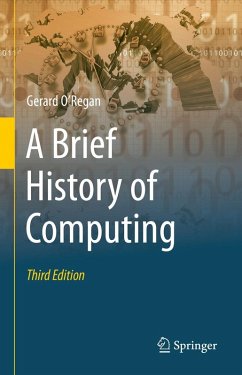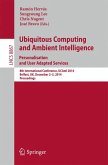The history of computing has its origins at the outset of civilization, and the need for increasingly sophisticated calculations has grown as towns and communities evolved.
This lively and fascinating text traces the key developments in computation - from 3000 B.C. to the present day - in an easy-to-follow and concise manner. Providing a comprehensive introduction to the most significant events and concepts in the history of computing, the book embarks upon a journey from ancient Egypt to modern times; taking in mechanical calculators, early digital computers, the first personal computers and mobile phones, to the history of software engineering, the evolution of programming languages and the invention of the World Wide Web, among other topics. This expanded and revised new edition also examines the birth of the software industry and the evolution of human-computer interaction, in addition to innovations such as Cloud computing, the Internet of Things, and Quantum Computing.
Topics and features:
· Ideal for self-study, offering many pedagogical features such as chapter-opening key topics, chapter introductions and summaries, exercises, and a glossary
· Presents detailed information on major figures in computing, such as Boole, Babbage, Shannon, Turing, Zuse and Von Neumann
· Discusses the earliest computers developed in the United States, Germany and Britain.
· Discusses the development of the IBM 360 family of computers and its importance
· Discusses the birth of the software industry and the evolution of human-computer interaction
· Reviews the history of software engineering, programming languages, and operating systems
· Discusses the progress of the field of artificial intelligence
· Examines the impact on society of the introduction of the personal computer, the World Wide Web, and mobile phone technology
· Discusses a miscellany of innovations in computing such as cloud computing, the Internet of Things, and Quantum Computing· Discusses legal aspects of computing and professional responsibilities of computer professionals
This clearly written and broad-ranging text both gives the reader a flavour of the history and stimulates further study in the subject. As such, it will be of great benefit to students of computer science, while also capturing the interest of the more casual reader.
About the Author:
Dr. Gerard O'Regan is a consultant with research interests including software quality and software process improvement, mathematical approaches to software quality, and the history of computing. He is the author of such Springer textbooks such as Concise Guide to Formal Methods, Concise Guide to Software Engineering, Mathematics in Computing, and Concise Guide to Software Testing.
This lively and fascinating text traces the key developments in computation - from 3000 B.C. to the present day - in an easy-to-follow and concise manner. Providing a comprehensive introduction to the most significant events and concepts in the history of computing, the book embarks upon a journey from ancient Egypt to modern times; taking in mechanical calculators, early digital computers, the first personal computers and mobile phones, to the history of software engineering, the evolution of programming languages and the invention of the World Wide Web, among other topics. This expanded and revised new edition also examines the birth of the software industry and the evolution of human-computer interaction, in addition to innovations such as Cloud computing, the Internet of Things, and Quantum Computing.
Topics and features:
· Ideal for self-study, offering many pedagogical features such as chapter-opening key topics, chapter introductions and summaries, exercises, and a glossary
· Presents detailed information on major figures in computing, such as Boole, Babbage, Shannon, Turing, Zuse and Von Neumann
· Discusses the earliest computers developed in the United States, Germany and Britain.
· Discusses the development of the IBM 360 family of computers and its importance
· Discusses the birth of the software industry and the evolution of human-computer interaction
· Reviews the history of software engineering, programming languages, and operating systems
· Discusses the progress of the field of artificial intelligence
· Examines the impact on society of the introduction of the personal computer, the World Wide Web, and mobile phone technology
· Discusses a miscellany of innovations in computing such as cloud computing, the Internet of Things, and Quantum Computing· Discusses legal aspects of computing and professional responsibilities of computer professionals
This clearly written and broad-ranging text both gives the reader a flavour of the history and stimulates further study in the subject. As such, it will be of great benefit to students of computer science, while also capturing the interest of the more casual reader.
About the Author:
Dr. Gerard O'Regan is a consultant with research interests including software quality and software process improvement, mathematical approaches to software quality, and the history of computing. He is the author of such Springer textbooks such as Concise Guide to Formal Methods, Concise Guide to Software Engineering, Mathematics in Computing, and Concise Guide to Software Testing.
Dieser Download kann aus rechtlichen Gründen nur mit Rechnungsadresse in A, B, BG, CY, CZ, D, DK, EW, E, FIN, F, GR, HR, H, IRL, I, LT, L, LR, M, NL, PL, P, R, S, SLO, SK ausgeliefert werden.
From the reviews of the second edition: "The book under review ... provides a succint (about 250 pages) reference book to computing topics (ranging from history to people to basic concepts). ... In its succint presentation the book has several strengths: It deals with pioneers (like Zuse) and historical issues ... . The book aims at the general reader or student with some general mathematical background knowledge and some experience with computers who needs a short offline encyclopedia." (Manuel Bremer, Zentralblatt MATH, Vol. 1244, 2012)



